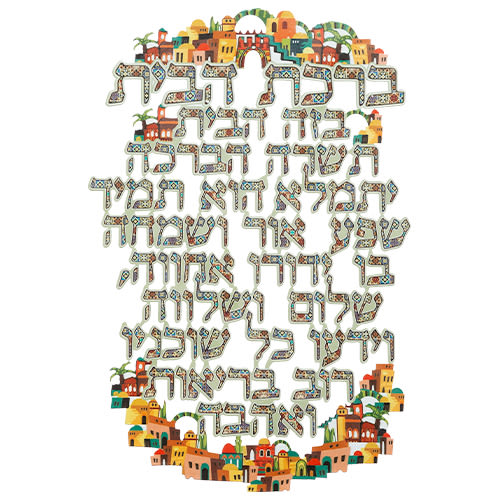
Just Desserts
Since our children are mirrors of our relationship with G-d, it slowly dawned on me that I was looking at a painfully candid replica of my own Avodat Hashem...

My usual cycle with the children is to react first, and think later. But I always say better late than not at all! Hashem wills us failures sometimes precisely so that we will think about them, learn something about ourselves, and strive to improve. Of course, this is no easy task for a stubborn person like me, so it’s pretty much a regular occurrence. You could say I’m a long-range project making excruciatingly slow, but steady, progress.
This Friday night dinner went relatively smoothly for once in our rowdy household, with only a few mild sibling spats and some  questionable (read, gross) table manners vying for attention at the Shabbat table.
questionable (read, gross) table manners vying for attention at the Shabbat table.
And then it was time for dessert.
As in most households, parents like to encourage their children to eat their healthy meals before they get rewarded with dessert. And, in most normal households, usually children go along with this familiar routine. I’m not too much of a stickler for this, maybe because I’m such a sucker for dessert. But since the only time I offer a sweet and gooey last course is on Shabbat or a Jewish Festival, I want it to be part of the meal, not simply a reward. That said, I am now, after several kids, genetically predisposed to textbook parenting, so the offer slipped out automatically: “OK kids, whoever eats their dinner gets chocolate mousse!” There. It was out in the open. Here’s what happened:
My oldest son ate a lot, as usual, then promptly asked for his dessert, which he ate with gusto. My daughter finished her dinner, and then left the table to read. My younger son very reluctantly let me put a minuscule amount of food on his plate, refused to eat more than two bites, and then ceremoniously announced that he now wanted his dessert.
I have seen this 2-bite stand-off many a time over many a table, and am always amazed at how one script can be acted out in dozens of ways. What would you have done? Well, for once, I did the opposite of what every bone in my body wanted me to do. I gave him dessert. I said, ‘Oh, all right, it’s Shabbat. How can I not give you dessert on Shabbat?’ And then he ate it, in silence. Two minutes later my daughter announced she was going to bed. ‘What about your dessert?’ I asked. Oh, she’d forgotten about it. Maybe tomorrow. And as for me, I sat and pondered about what had just transpired.
One dessert, three reactions.
Since our children are our mirrors, and, even more specifically according to Rabbi Nachman, mirrors of our relationship with G-d, it slowly dawned on me that I was looking at a painfully candid replica of my ownAvodat Hashem, service to G-d. In this case, the Shabbat meal was my avoda, and the dessert symbolized The World to Come, Olam Haba, my spiritual reward in the next life. Each child’s partaking of their meal was a different version of my attitude to both.
Sometimes, I am like my oldest son. I happily eat the meal knowing there is a dessert, but really, I’d eat the meal anyway, even if there was no dessert to look forward to. So it goes when I perform certain mitzvoth, Torah commandments. I know there is an eternal reward, and I am happily aware of it as I perform the deed, but really, I’d do it anyway. It’s automatic. I couldn’t imagine not doing it; like keeping kosher, for example.
Then there are the times that I eat the meal aware of the dessert, but forget about the dessert along the way, like my daughter. I know there is eternal reward for, say, separating a small portion of challah dough before baking it, but I get so swept up in the fun of the kneading, braiding and baking that goes with it, that I forget about the spiritual benefit. I simply enjoy the work. And the smell. Oh, and the taste….
And then there are the far-too-many times that I am just like my youngest son. I don’t take on too much, take a couple of ‘bites’, and then, not wanting to budge another inch, announce that I still want the jackpot, too. Sometimes, I just don’t want to do the inner work required. Sometimes, I hope that my other deeds will carry me to where I want to go, because some things are simply too hard, or too seemingly impossible, and I even think, sometimes, beyond my grasp. I still want the spiritual reward, even for the most basic of efforts. Points for trying, in other words.
There may be a good reason for this feeling. Our sages tell us that every Child of Israel has a portion of the World To Come, Olam Haba. Really? Even the bad guys? Then why am I trying so hard? So, does that mean that deep down in my soul, I have a pre-programmed sense of entitlement? To be honest, we shouldn’t be delving too much into these other-worldy matters , but I did admit earlier that I was a sucker for dessert…
Since what our sages say can only be true, then yes, we will all arrive, at some point, and in some state, to our designated station in the eternal bliss of Olam Haba. However, according to Jewish esoteric thought, it isn’t equally experienced bliss. Our sages teach that our future eternal spiritual existence will reflect our earthly attitude and effort. Like my youngest son, whose vociferously and easily won dessert was eventually eaten in silence, so too, may be the eternal feeling of spiritual ‘easy come’.
At the same time, I had a sudden, tiny glimmering of – insight? – as to how our Sages guarantee our portion in Olam Haba, regardless of merit. In the same way that I didn’t have the heart not to serve my son his dessert for his miniscule effort (he was at the table, wasn’t he?), so too we receive our eternal ‘dessert’ for coming to Hashem’s table, so to speak, for being one of His children.
Hashem loves us, He’s our Heavenly Father: He doesn’t ‘dangle’ a reward in front of us and then snatch it away at the last minute. He created the recognition we feel when we are rewarded beyond our efforts, as I saw in my little boy as he quietly ate his mousse. I didn’t need to lecture him, nor withhold his dessert, either.
As I saw myself so blatantly reflected in the children, I felt that Hashem was showing me my own inconsistencies and weaknesses so that I may improve. And at the same time, He was accepting those weaknesses, just as I accepted my children, each one according to his personality.











1/15/2012
You are great mother… and a role model… May Your kids learn from You and grow to be great talmidei chachomim and baalei middot
1/15/2012
and a role model… May Your kids learn from You and grow to be great talmidei chachomim and baalei middot
1/08/2012
thanks beautiful, thanks for the chizzuk 🙂